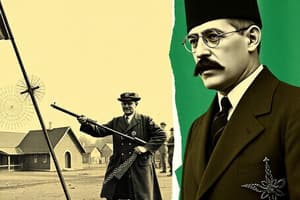Podcast
Questions and Answers
Plutarco Elías Calles nació en 1877 en Guadalajara, Jalisco.
Plutarco Elías Calles nació en 1877 en Guadalajara, Jalisco.
False (B)
Calles no tuvo ningún papel significativo en la Revolución Mexicana.
Calles no tuvo ningún papel significativo en la Revolución Mexicana.
False (B)
Calles fue presidente de México de 1924 a 1928.
Calles fue presidente de México de 1924 a 1928.
True (A)
El "Maximato" se refiere al período en el que Calles ejerció influencia política significativa sin ser formalmente presidente.
El "Maximato" se refiere al período en el que Calles ejerció influencia política significativa sin ser formalmente presidente.
Calles favoreció el desarrollo de un estado religioso y apoyó la influencia de la iglesia en la esfera pública.
Calles favoreció el desarrollo de un estado religioso y apoyó la influencia de la iglesia en la esfera pública.
La administración de Calles vio una disminución de las tensiones con la Iglesia Católica.
La administración de Calles vio una disminución de las tensiones con la Iglesia Católica.
Calles implementó reformas centradas en cuestiones agrarias y politicas.
Calles implementó reformas centradas en cuestiones agrarias y politicas.
Calles apoyó la distribución de tierras y las reformas laborales.
Calles apoyó la distribución de tierras y las reformas laborales.
Flashcards
Nacimiento de Calles
Nacimiento de Calles
Nació en 1877 en Guaymas, Sonora, México, en una familia pobre.
Revolución Mexicana
Revolución Mexicana
Figura significativa en la Revolución, apoyó a Obregón y derrotó a Huerta.
Presidencia de Calles
Presidencia de Calles
Presidió México de 1924 a 1928, enfocándose en estabilizar el país.
Maximato
Maximato
Signup and view all the flashcards
Agenda nacionalista
Agenda nacionalista
Signup and view all the flashcards
Conflicto con la Iglesia
Conflicto con la Iglesia
Signup and view all the flashcards
Cambio estructural
Cambio estructural
Signup and view all the flashcards
Legado de Calles
Legado de Calles
Signup and view all the flashcards
Study Notes
Early Life and Rise to Power
- Born in 1877 in Guaymas, Sonora, Mexico.
- His family was relatively poor, and he worked various jobs before entering politics.
- Calles' early career involved organizing and mobilizing urban workers.
- He became a powerful figure among local factions.
Role in the Mexican Revolution
- A significant figure in the Mexican Revolution.
- Initially aligned with Álvaro Obregón, an important revolutionary leader.
- Played a key role in the overthrow of the dictator Victoriano Huerta.
- Supported the Constitutionalist forces during the Mexican Revolution.
Presidency and the Maximato
- Served as President of Mexico from 1924 to 1928.
- His presidency was characterized by efforts to stabilize the country after the Revolution.
- Implemented reforms focused on agrarian and political issues.
- Sought to establish a strong national government.
- He used his influence to maintain power, even after leaving the presidency. He exercised significant influence during the Maximato period (1928-1934). The term Maximato referred to this period when a single figure (Plutarco Elias Calles) wielded decisive political control even without being formally president.
Political Ideology and Actions
- Calles promoted a nationalist agenda.
- Supported the development of a secular state.
- Favored labor reforms and agrarian distribution.
- Involved in developing the "Sonoran dynasty," an informal political alliance with other important revolutionaries like Álvaro Obregón.
- Often intervened in the affairs of different branches of the government.
- Faced opposition from various groups due to his authoritarian methods.
Impact and Legacy
- Played a critical role in shaping the political landscape of post-revolutionary Mexico.
- His policies had a profound effect on the development of institutions and the economy.
- Introduced crucial structural changes that lasted for decades.
- Created lasting tensions within Mexico's political and societal spheres.
- His actions led to significant political conflicts that continued long after he left office.
- Created a legacy interwoven with both advancements and significant issues.
Relationship with the Church
- His administration saw increased tension with the Catholic Church.
- Implemented policies intended to limit religious influence in the public sphere.
- These policies led to resistance and conflict, impacting the society.
- Restrictions on the role of the church contributed to political divisions.
Economic Policies
- Promoted economic development through infrastructure projects.
- Encouraged national industrial growth, aiming to improve the country's economy.
- Implemented policies with varied effects on industry and trade.
- Introduced economic programs for managing the country during a time of great transition.
Later Years and Death
- Remained a powerful force in Mexican politics even after leaving the presidency.
- Faced opposition and criticism for his actions.
- Later years saw him living under various forms of pressure.
- Died in 1945.
Studying That Suits You
Use AI to generate personalized quizzes and flashcards to suit your learning preferences.




